- Home
- Mary Downing Hahn
Look for Me by Moonlight
Look for Me by Moonlight Read online
Table of Contents
Title Page
Table of Contents
Copyright
Dedication
Epigraph
1
2
3
4
5
6
7
8
9
10
11
12
13
14
15
16
17
18
19
20
21
22
Read More from Mary Downing Hahn
About the Author
Clarion Books
215 Park Avenue South
New York, NY 10003
Text copyright © 1995 by Mary Downing Hahn
All rights reserved.
For information about permission to reproduce selections from this book, write to Permissions, Houghton Mifflin Harcourt Publishing Company, 215 Park Avenue South, New York, New York 10003.
www.hmhco.com
The Library of Congress has cataloged the print edition as follows:
Hahn, Mary Downing.
Look for me by moonlight / by Mary Downing Hahn.
p. cm.
Summary: While staying at the remote and reputedly haunted Maine inn run by her father and pregnant stepmother, sixteen-year-old Cynda feels increasingly isolated from her father’s new family and finds solace in the attentions of a charming but mysterious guest.
ISBN 0-395-69843-X
[1. Horror stories. 2. Vampires—Fiction. 3. Ghosts—Fiction. 4. Stepfamilies—Fiction. 5. Hotels, motels, etc.—Fiction. 6. Maine—Fiction.] I. Title.
PZ7.H1256LO 1995
[Fic]—dc20
94-21892
eISBN 978-0-547-48772-4
v3.0714
For
NANCY AND BEV
With thanks for all the encouragement
Then look for me by moonlight,
Watch for me by moonlight,
I’ll come to thee by moonlight, though hell
should bar the way.
“The Highwayman,” Alfred Noyes
1
Sometimes you can pinpoint the exact moment in your life when things begin to go wrong. For me, it was the day my father left my mother. I was six years old, too young to understand what was happening except that it involved a student in one of Dad’s literature classes. A girl named Susan. Because of her, he was moving out of our house. I cried and begged him to stay, I swore I’d be good, but nothing I said or did made any difference. Dad packed his bags and his books and kissed me goodbye.
“I love you, Cynda,” he said. “No matter where I live, I’ll always be your father, and you’ll always be my daughter. Nothing will change.”
Of course, it wasn’t true. A year later, Dad moved to Maine with Susan and I stayed in Maryland with Mom. That meant he was suddenly almost a thousand miles away. It also meant I saw less and less of him.
Not long after Dad married Susan, Mom married Steve, and things changed again. We became a Navy family, hopscotching all over America. California, Florida, Virginia—we never stayed in one place long enough for me to make friends, settle down, and feel comfortable.
When Steve announced we were going to Italy for three years, I flat-out rebelled. Giving up all pretense of being a mature sixteen-year-old, I threw a major temper tantrum which resulted in a series of phone calls between my mother and my father. The end result was an invitation to stay with Dad for at least six months, maybe longer if things worked out.
Mom’s role in setting up the visit surprised me. She’d never forgiven Dad for falling in love with Susan. Nor did she approve of his career. In addition to writing best-selling mysteries, he ran an old inn on the Maine coast—occupations my mother denounced as fiscally irresponsible, proof of Dad’s immaturity and selfishness.
Later, when I had time to think about it, I came to the conclusion that Mom and Steve had decided Italy would be more fun without me. To be candid, things hadn’t been good in our house since I turned thirteen and, as Mom put it, lost my mind overnight. Which meant I changed from an obedient child who never gave anyone a second’s trouble into an obnoxious teenager who left wet towels on the bathroom floor and dirty dishes in front of the television, played loud music, and argued about everything from politics to curfews. Maybe Mom thought it was Dad’s turn to cope with me. Maybe I was her revenge.
Whatever her reasons, Mom put me on a plane to Maine one cold January day. As I left National Airport in Washington behind, I tried to convince myself I was going to a new and better life with Dad, but deep down inside I wasn’t so sure. I hadn’t seen my father for almost two years, hadn’t talked to him about anything important for longer than that. Worse yet, I’d never met his wife or their son, now five years old. I might not like Susan, she might not like me. Todd might be spoiled and bratty.
By the time my plane landed, I’d had more time to think (and worry) than I’d expected. Thanks to winter storms buffeting the coast from Virginia to Nova Scotia, my flight had been delayed, diverted, and unexpectedly stranded in Boston for two hours. I’d eaten lousy food and washed it down with even worse coffee. I’d read a three-hundred-page novel whose plot I’d already forgotten. I’d been pushed and jostled and propositioned by strangers. Not to mention bounced from one air pocket to another all the way to Bangor.
Jumpy, jangled, and tense, I was too strung out with anxiety to join the passengers mobbing the aisle. I stayed in my seat, closed my eyes, and tried to relax. In a few minutes, I’d come face to face with a father who might not even recognize me. I was going to stay with him for six months. Twenty-four weeks, more or less. A hundred and seventy-eight days. What would we do? What would we say? A lot could go wrong in half a year.
The doubts I’d swept under the rug began to crawl out, bigger and uglier than ever. How did Dad feel about me? Did he really want me? Or was he just doing Mom a favor? He had Susan now. And Todd. He didn’t need me. Neither did Mom. She had Steve. But who did I have? Not even a boyfriend.
“Are you all right, sweetie?”
I looked up to see a flight attendant staring down at me. Red-faced with embarrassment, I hastily gathered my belongings. While I’d been brooding, everyone else had gotten off the plane. I was the only passenger still on board.
“It was a terrible flight,” the attendent said as if bad weather explained everything. Chattering cheerfully about air turbulence, she followed me to the plane’s exit, wished me well, and waved goodbye.
I expected to see Dad at the gate, but he wasn’t there. No one was. The waiting area was deserted, the check-in desk unstaffed. Discarded newspapers and rows of empty seats gave the place a surreal look. It could have been a set for a movie about the end of the world.
Fighting panic, I reminded myself that Dad lived way up the coast, close to Canada. The snow had probably delayed him. He’d be here soon. I sat down and leafed aimlessly through my book. After a few minutes, my imagination began churning out increasingly scary scenarios. The storm had closed the roads. Dad had given up and gone back home. He couldn’t call because the telephone lines were down. Maybe he’d had an accident. Maybe he was in the hospital. Maybe he’d forgotten I was coming.
What was I going to do? It was dark and cold outside. I knew no one in Bangor. I didn’t have enough money to buy a return ticket. And even if I did go back to Washington, where would I stay? Our house was rented. Like a little kid, I wanted my mother, but she was on her way to Italy, blithely assuming I was safe with Dad.
An hour passed. I cried for a while, then I got mad. People arrived to meet a flight from Albany. I hated th
em for not being my father. I hated my father for not being them.
Just as the Albany passengers deplaned, Dad came hurrying toward me. He looked the same as I remembered, ruddy-faced and with a full beard. “Cynda, I’m so sorry,” he said, giving me a hug. “The roads were terrible—accidents all the way to Bangor, cars and trucks everywhere. I’m lucky I got through.”
I clung to him, crying again in spite of myself. “I was scared something had happened to you,” I sobbed. “I thought you’d gone off the road, I was afraid you’d forgotten . . .”
Dad apologized again, adding, “Don’t be silly, honey. Nothing could have stopped me from getting here. Neither rain nor sleet nor whatever, as the post office puts it.”
I tried to smile, to make our reunion go the way I’d planned, but all the clever things I’d meant to say dissolved into a silly jumble of platitudes and corny cliches.
“You look great,” Dad said, probably to cover up the awkward silence developing between us. “Prettier than ever, just plain lovely.”
I shrugged Dad’s compliments away, too embarrassed to thank him, and followed him to Baggage Claim. On the way, I glanced at my reflection in a plate-glass window, hoping to see what he saw. There I was—a tall, thin girl with a pale, narrow face and long, dark hair, tangled from sleeping on the plane. Gawky. All arms and legs and feet. A loping walk Mom had tried unsuccessfully to correct with ballet lessons.
Who was Dad kidding? At sixteen, I was far from pretty, even further from lovely. Just plain was more like it.
After we found my suitcases, we loaded them into an old Volvo station wagon and headed north toward Underhill Inn, dodging in and out of snowstorms all the way to the coast. I was too tired to say much, so I let Dad do most of the talking, something he obviously enjoyed. He began by telling me how much Susan and Todd were looking forward to meeting me. I hoped it was true. Next he gave a long account of Susan’s many talents, which included decorating, bookkeeping, and sewing.
“You’ll love her,” he said confidently. “And wait till you see Todd. You’ll adore him, Cynda. Everybody does.”
Still talking, Dad accelerated to pass a log truck, and I closed my eyes, certain the chains holding the logs would break and we’d be crushed to death under the load. The Volvo fishtailed on the snowy road, but Dad was too absorbed in telling me about Todd to notice I was frightened. If my father was to be believed, my half brother was a child prodigy, sensitive and imaginative as well as charming.
How nice, I thought, but what about me? Was I special too? Or was I merely the daughter he left behind when he fell in love with Susan?
After we turned off Route 9, Dad asked if I’d like to stop for coffee. “We still have about thirty miles to go, and I could use a break.”
“Coffee and something to eat,” I said, grabbing the chance to keep Dad to myself a little longer. Maybe we’d relax over coffee and feel comfortable with each other. Maybe he’d ask a question that would open my heart. Maybe he’d at least stop talking about Todd.
“There’s the Seaside Diner’s sign.” Dad pointed at a pink glow in the sky I’d mistaken for the northern lights. “It’s the only place open at this hour.”
A few minutes later, Dad maneuvered the Volvo into a parking place behind a pickup truck so coated with road salt I couldn’t read the license plate. “Welcome to the thriving metropolis of Ferrington,” he said.
Mountains of plowed snow hid most of the town, but I made out a row of dark buildings, among them a beauty salon, a small grocery, a pharmacy, and a video rental store. The rest of the shops were boarded up, closed for the season. Or maybe forever.
The diner was across the street. Even though it was early January, red cardboard letters still hung in the steamy windows, spelling out a crooked Merry Christmas. The huge neon sign splashed the snow with colored light.
Inside, three old men sat at the counter, drinking coffee and smoking. Otherwise the place was deserted. Even the jukebox was silent.
“What can I bring you, Mr. Bennett?” The middle-aged waitress spoke to Dad but stared at me with undisguised curiosity. “The chowder’s excellent tonight. Thick and creamy, lots of clams—just the way you like it.”
“Sounds great.” Dad looked at me. “How about you, Cynda?”
I said I’d have the chowder too, and Dad turned to the waitress. “Two bowls, please, and a pot of your finest coffee, Gina, as hot and strong as you can make it.”
While she jotted down our order, Gina kept her eyes on me. Finally Dad noticed. “This is my daughter, Cynthia,” he said. “Cynda for short. She just flew in from Washington, D.C.”
Gina smiled as if Dad had merely confirmed something she already knew. “Martha said you were coming today.”
“Martha Bigelow,” Dad explained to me. “She helps Susan with the cleaning. We couldn’t run the inn without her.”
By the time Gina returned with our order, Dad was drawing a diagram of Underhill Inn on a paper napkin, pointing out various rooms and talking about the building’s history.
“This part dates all the way back to 1781, but the rest of it just grew over the years.” Dad’s finger moved from square to square. “A room here, a room there.”
Gina set the bowls down, taking care not to spill any chowder on Dad’s floor plan. “You should have seen Underhill before your father bought it, Cynda. The place had been empty for years. Windows and doors boarded up, roof fallen in, swallows roosting in the chimneys . . . a real rum.”
“Now, Gina, it wasn’t as bad as that,” Dad said. “The walls were sound, and so was the foundation. All Underhill needed was a little love—and several thousand dollars’ worth of work.”
“It’s a marvel what you and Mrs. Bennett have done,” Gina insisted. Turning to me, she said, “In the summer, the inn’s packed with folks from all over the map—California, Hawaii, Florida. Some Germans stayed for a whole month last August. Lovely people.”
She paused to wipe a spot on the table. “It’s a lonely place in the winter, though. Very bleak, nobody around, nothing to do.”
“That’s when I love Underhill the most,” Dad said quickly. “No guests, no interruptions, plenty of time to write.”
“I guess it’s all in how you look at it,” Gina said, “but you couldn’t pay me to stay there. Not in the winter. Maybe not even in the summer.”
“Why not?” I stared at her, startled by her bluntness.
Gina glanced at Dad. “Haven’t you told Cynda about the ghost?”
“You know what I think of that nonsense.” Dad winked at me but I didn’t return his smile.
“Is Underhill haunted?” I asked Gina.
“Most folks around here think so.” She frowned at Dad. “If you don’t believe me, ask Martha Bigelow. She often feels something watching her when she’s upstairs cleaning. Gives her goose bumps all over.”
A little shiver raced up and down my spine, but Dad snorted with disbelief. Gina leaned across the table and gazed into his eyes. “Don’t tell me you’ve never noticed anything strange, Mr. Bennett.”
He shook his head emphatically, but Gina wasn’t satisfied. “How about your guests, then?”
“They complain about the weather, they fuss about the mattresses and the TV reception, but nobody has ever said a word about ghosts.” Dad slid his empty cup toward Gina. “How about a refill?”
Gina took the hint and left to get the coffee pot, but I wasn’t ready to drop the subject. “How can you be so sure it’s all nonsense, Dad? Maybe Mrs. Bigelow is psychic, maybe there really is a ghost. . . .”
“I have more important things to worry about. Paying the mortgage, for instance. Keeping my guests happy. Hoping the furnace will make it through another winter.”
“But you write mysteries,” I persisted, surprised by his attitude. “Wouldn’t a haunted inn be a good setting for a story?”
Dad looked insulted. “My novels are serious police procedurals,” he said stiffly. “They deal with murder, arson, armed robb
ery, and drugs. The supernatural is Stephen King’s territory. Not mine.”
Rebuked, I lowered my head and began to eat my chowder. I’d say no more about ghosts to Dad. I wanted him to think well of me, to brag about me the way he bragged about Todd. I didn’t dare risk lowering his opinion of me by admitting Gina had scared me.
When Gina returned, I thought she might say more about Underhill, but Dad’s attitude must have discouraged her, too. She made a comment about the record-breaking cold, totaled our bill, and walked off with Dad’s tip jingling in her pocket.
As we left Ferrington behind, I found myself wishing Dad lived in one of the big old houses we’d passed on our way out of town. They’d looked as warm and welcoming as illustrations in a child’s picture book. Surely no ghosts lurked in their cozy rooms.
Dad caught me shivering and smiled, mistaking the reason. “Maine takes some getting used to, Cynda. We only have two seasons, you know. Eleven months of winter and one of summer.”
I forced myself to laugh, but my father’s joke didn’t dispel the odd, lingering dread I felt. Staring into the darkness ahead, I wondered why people thought Underhill was haunted. Since I couldn’t ask Dad, I’d talk to Mrs. Bigelow the next time she came to clean the inn. Maybe she’d tell me what sort of ghost watched her from the shadows.
2
The farther we drove, the darker and lonelier the night seemed. No stores, no houses, just an occasional mailbox marking a driveway. Snowy fields crosshatched with woods. A stone wall. An old barn. Nothing to light our way but the moon, sailing in and out of clouds, as pale and regal as a queen crowned with stars.
Gazing at the sky, Dad said, “The moving moon went up the sky, And nowhere did abide.’”
“‘Softly she was going up,’” I added. “‘And a star or two beside—’”
Dad looked pleased. “You know Coleridge.”
For one lovely moment, I felt as close to Dad as I’d hoped to. He’d quoted a line of poetry that floated through my head whenever I looked at the moon wandering across the heavens, unfixed, homeless, alone.

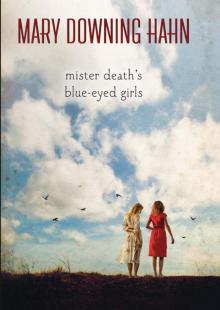 Mister Death's Blue-Eyed Girls
Mister Death's Blue-Eyed Girls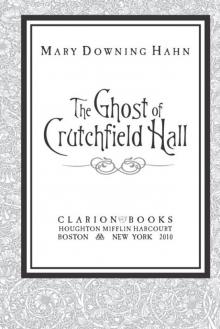 The Ghost of Crutchfield Hall
The Ghost of Crutchfield Hall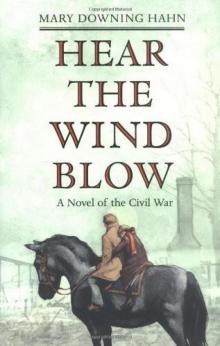 Hear the Wind Blow
Hear the Wind Blow Time of the Witch
Time of the Witch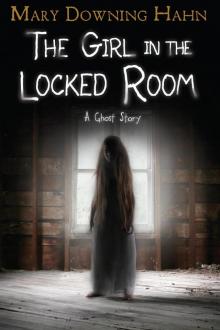 The Girl in the Locked Room: A Ghost Story
The Girl in the Locked Room: A Ghost Story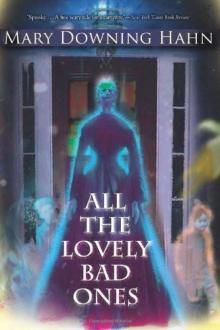 All the Lovely Bad Ones
All the Lovely Bad Ones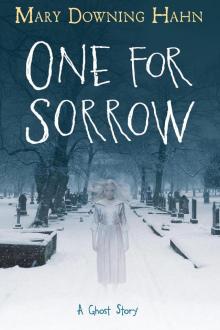 One for Sorrow
One for Sorrow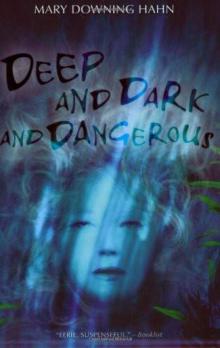 Deep and Dark and Dangerous
Deep and Dark and Dangerous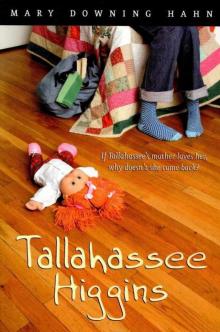 Tallahassee Higgins
Tallahassee Higgins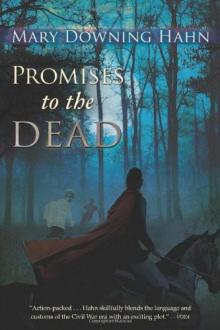 Promises to the Dead
Promises to the Dead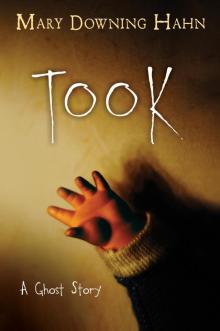 Took: A Ghost Story
Took: A Ghost Story Following My Own Footsteps
Following My Own Footsteps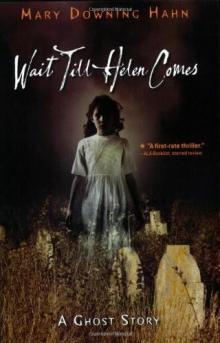 Wait Till Helen Comes: A Ghost Story
Wait Till Helen Comes: A Ghost Story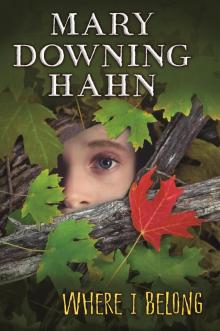 Where I Belong
Where I Belong The Spanish Kidnapping Disaster
The Spanish Kidnapping Disaster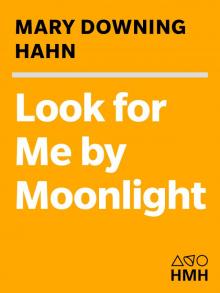 Look for Me by Moonlight
Look for Me by Moonlight The Old Willis Place
The Old Willis Place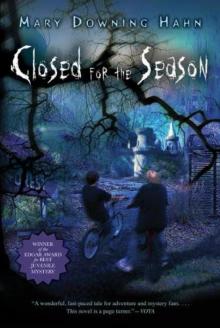 Closed for the Season
Closed for the Season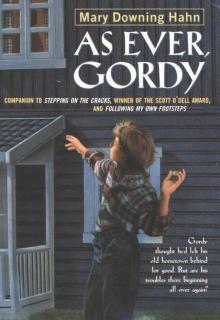 As Ever, Gordy
As Ever, Gordy Anna on the Farm
Anna on the Farm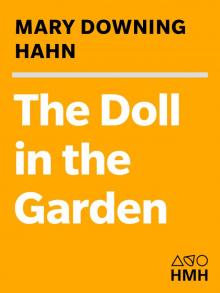 The Doll in the Garden
The Doll in the Garden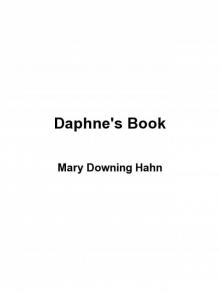 Daphne's Book
Daphne's Book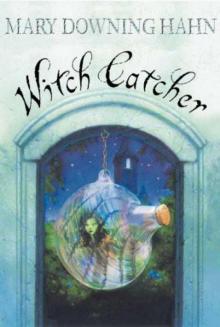 Witch Catcher
Witch Catcher The Gentleman Outlaw and Me--Eli
The Gentleman Outlaw and Me--Eli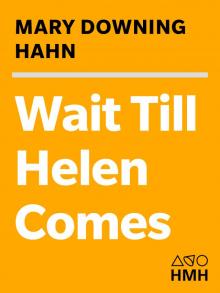 Wait Till Helen Comes
Wait Till Helen Comes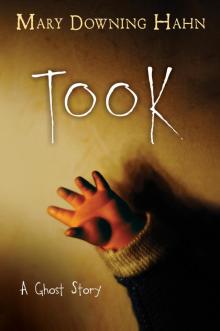 Took
Took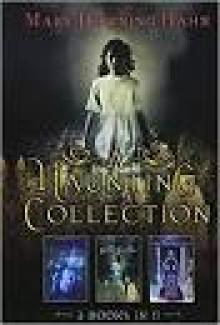 A Haunting Collection
A Haunting Collection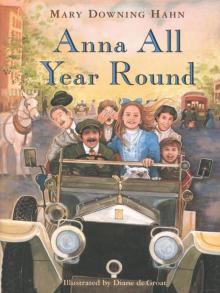 Anna All Year Round
Anna All Year Round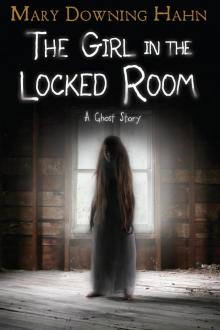 The Girl in the Locked Room
The Girl in the Locked Room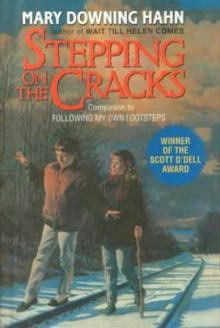 Stepping on the Cracks
Stepping on the Cracks